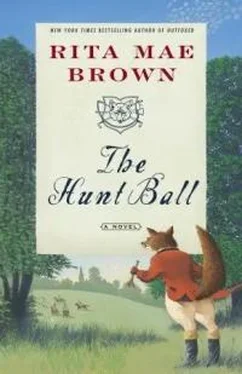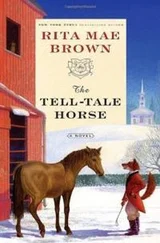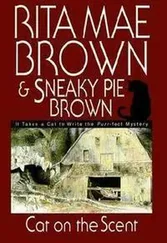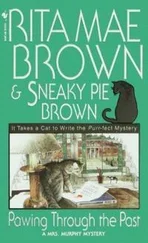“I hadn’t thought of that.” Al glanced quickly at Amy.
Dorothy and two assistants rolled in a table of sandwiches, cakes, freshly cut vegetables, dipping sauces, a large pot of coffee, and a large pot of tea.
“I didn’t know how hungry I was,” Knute said, waiting for Charlotte to stand.
“Please”—she indicated they should fill their plates.
The two assistants poured coffee, helped with plates. Dorothy returned to her office over the dining hall, a room right out of Oxford, stained-glass windows shining bits of color on mahogany panels.
“Amy, Knute, Al, if there are any students you feel close to, talk to them. I’ll ask our other faculty to also be on the alert for anyone who might need extra attention or guidance. Sometimes the girls need to vent.” Charlotte couched her orders as thoughts while the others ate. “Christopher, I know you’re overburdened, but perhaps you could put an assistant on researching any suits that have been pressed over similar issues.”
“You know, that would be interesting,” and he meant that, too.
“Knute, one more time,” she smiled, “go over our budget and see if there’s any fat that can be squeezed to send some of the girls on research trips, say to Poplar Forest or Mount Vernon.”
“They can use the Internet,” Amy replied before Knute could.
“They’ll do that anyway,” Charlotte answered. “If they go to places Miss Custis knew as a child, as a young woman their age, it will make it much more vivid.” She turned to Knute. “Take a peek.”
“All right.” He settled in to a club sandwich.
They batted around more ideas. Charlotte discreetly kept her eye on the time.
“You know, we were lucky no one smashed a case,” Al said. “How could we ever replace Washington’s epaulettes? We were really lucky.”
Knute replied, “That’s exactly why I think the cases should stay locked, and I agree with Amy, the kids don’t need their hands on those things.”
“Do we have a value on that stuff?” Amy was curious.
“Well, we really don’t.” Charlotte wrinkled her brow for a second. “I guess we could hire an appraiser, but how would you value a page from George Washington’s diary or his wife’s hunting crop?”
“That’s just it, Charlotte, someone has to, because those things are irreplaceable. National treasures.” Christopher’s pleasant voice filled the room. “Course, if the girls smash the cabinets, I’ll have to get them on breaking and entering.” He smiled.
“Would you like me to find an appraiser?” Al asked. “I’m sure many of our alumnae have valuable items and would be a source for recommendations.”
“Al, with all due respect, I don’t think we should go that route until the waters are becalmed.” Knute sailed in his spare time and dotted his conversations with sailing terms.
“That’s a thought.” Charlotte leaned toward Knute. “If we discuss what we have in our care in terms of cold cash, at this moment, we may invite more reprisals. But I definitely think this is necessary for the near future and we must find someone whose credentials are impeccable.”
“You know, if I’d known it was going to be this much trouble, I’d have picked the cotton myself,” Amy commented and languidly sipped her coffee.
“That is so insensitive! Amy, you astonish me.” Al’s face reddened.
“For Christ’s sake, get a sense of humor.” She stared at him.
“But that’s always it, isn’t it?” He bore down on Amy. “The oppressed are supposed to laugh when the oppressor makes fun of them. How can you laugh at your own suffering? I mean, do you think it’s funny if someone white wears blackface? Used to be a scream. Do you think it’s funny if a man gets up in drag?”
“Watch it, Al, you’ll kick off the transgender discussion.” Christopher, unlike Amy, chose his words with some care.
“Oh, balls!” Al put down his coffee cup with force.
An assistant quickly took it away, replacing it with a filled one that hadn’t spilled.
“Al, Amy is direct. Perhaps she is insensitive sometimes, but give her credit for being honest.” Knute wearied of these two sparring.
“You can be honest and dead wrong,” Al replied.
“I suppose you’d like to emphasize the dead.” Amy did have a sense of humor.
“With all due respect, this has been a trying morning. I value each of you for your contributions, but I’m not up to being a referee for my faculty and staff at this exact moment.” Charlotte’s voice was firm. “Everyone here has appointments. If you haven’t had enough to eat, take a sandwich, we can put a drink in a carry mug for you. But let’s get back on course.”
Charlotte cleared her office in ten minutes. She thanked the assistants, then she walked out to Teresa. “Can you believe those two?”
“I tune them out.” Teresa glanced over a list of calls she’d taken while Charlotte met with the group. “Your husband called. He’ll be home by six. He said he has a surprise.” Teresa looked up and smiled. “Bunny called. Said call her back when you have a minute. Nothing urgent. Um, Sonny Shaeffer called, you’ll receive an invitation for the bank’s Christmas party but he wants you and Carter to put it on your calendar now, um-m, December sixteenth, Friday.”
“Teresa, what do you think of all this?”
“I don’t know.”
“Are you saying that because I’m white?” Charlotte didn’t hold back.
“After all we’ve been through? Now you’re getting as sensitive as Al Perez.” She waited a beat. “If I’d had reporters in my face and Pamela Rene, you know, I’d be a little touchy myself. I don’t know what I think except—”
“Except what?”
“I have a strange feeling. I can’t pin it on anything. I know you hate clichés but, Charlotte, I think this is the tip of the iceberg.”
C H A P T E R 5
“ Lights, camera, action!” Marty Howard threw up her manicured hands, one magnificent marquise diamond catching the light. “Every year every hunt club puts on the standard, three-speed hunt ball. We’re breaking out.”
“As long as break out doesn’t mean break bad,” Sister slyly inserted into Marty’s eruption of ideas.
“Oh, Sister, how bad can it be?”
At that, Betty roared, “You have no idea. Get a mess of foxhunters in their best duds liquored up, all that cleavage suddenly in view, and fistfights and running off with other people’s spouses seems normal.”
Marty exclaimed, “Nothing like that ever happened in Indiana.”
“That’s why you moved here, dear,” Sister said in a silken voice.
Marty, while bright, missed the gradations of Virginia humor. She blinked. “Well, we came because Crawford wanted to retire at forty and get into the horse business, but I guess we got more than we bargained for. He’s built the hunter barn, the steeplechase barn, and now he wants to breed Herefords, the kind with horns. He’s either researching bloodlines on that computer he had built—to the tune of fifteen thousand dollars—or he’s reading stock market quotes on it.”
“Back to this hunt ball. Marty, I so appreciate you taking on this task. Getting Bill Wheatley and the theater students to help with decorating was a master stroke,” Sister praised Marty. “And I know even if you don’t make it public that you and Crawford have given a generous donation to Custis Hall for the theater department’s services.”
“We were happy to do it.” Marty glowed, for she did like being useful, and after eleven years she was finally feeling like part of the group.
“Betty as vice chair—and I accentuate the vice —really does know where all the bodies are buried and she can take care of the table sittings.” Sister smiled at Betty. “What else? Forgive me, by the way, for not being better organized. Over the years our social chairs have kept the Jefferson Hunt hopping and popping. I didn’t have to do but so much. Also, I’m not too good at this kind of thing.”
Читать дальше












